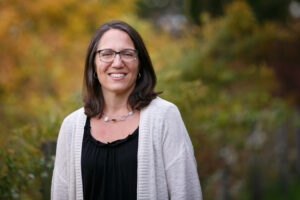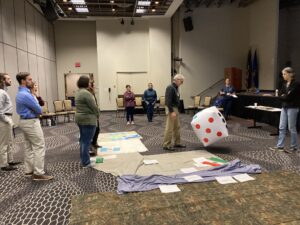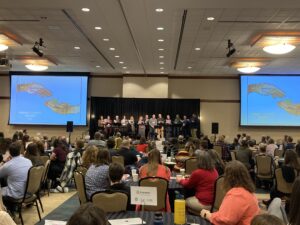 Jenn Esbenshade is the director of curriculum at Lancaster (Pennsylvania) Mennonite School. She attends New Holland (Pennsylvania) Mennonite Church.
Jenn Esbenshade is the director of curriculum at Lancaster (Pennsylvania) Mennonite School. She attends New Holland (Pennsylvania) Mennonite Church.
________________________________
After a three-year hiatus, Mennonite educators from 14 different schools from across the United States and Albania gathered together in Leesburg, Virginia, Feb 2-4, for the Mennonite Educators Conference (MEC), which was hosted by Mennonite Education Agency (MEA). What brought us all together? While there was serious discussion about the practicality and need for such a conference, ultimately, we recognized that we were “Better Together,” which was the theme for this year’s conference.
We need each other’s wisdom and support. We need to collaborate. And mostly, we need to just be together.
We also recognize that to be the best we can be in our roles, we need meaningful input. Dr. Judy Mullet, professor emerita from Eastern Mennonite University, reminded us of the power of story and how sharing a narrative can ultimately lead to the well-being of a community. We simply listen more to stories. We remember and engage more. We see ourselves in the story. Students feel they have a place when their story is heard.
Dr. John Spencer, education professor at George Fox University, continued and broadened this theme. Teachers were encouraged to give students the skills that they need to navigate the maze of a complex world. Instead of just working to incorporate “out of the box” thinking, students should try to think differently about the box. This requires divergent thinking that leads in new directions and inspires curiosity and creativity. Spencer also promoted “Vintage Innovation,” a both/and approach, combining the old and the new, looking back and looking forward, to empower students in the present. Students are, then, challenged to be innovators and creators who have the skills to succeed in a changing world. Dr. Spencer reminded us that each student is a unique, beloved child of God, guided by our ever-present God through this societal maze. To succeed, students need their teachers as their advocates. He explained how educators must embrace constraints in our work and consider whether we want to be a Nehemiah or an Ezra. Nehemiah was a “sage” who worked within the system to make changes, while Ezra was a “radical” who worked against the system to bring about change, but both did the good work that God had called them to.

He ended with a message of encouragement that even on our worst day, we are still someone’s hope.
The conference was also an intentional opportunity that sought to partner schools with other Mennonite organizations, in order to learn about different opportunities and deepen collaboration. Mennonite Central Committee, Mennonite Disaster Service and Mennonite Mission Network led sessions and activities to promote their programs and encourage further partnership in their work. Professors from Eastern Mennonite University and Goshen College also led breakout sessions, highlighting the work of restorative justice in education. Everence provided financial information to attendees, as well as led a session on how to help students manage their finances.
Educators also had plenty of time to fellowship and learn from one another. There were two breakout sessions, that were led mainly by educators, to discuss high-interest topics, giving opportunity for professional growth. Participants also met together in job-alike groups for three sessions. These conversations fostered dialogue and conversation around common experiences and concerns.
Throughout the conference, participants were invited to reflect on the theme of “Better Together” and what it means to them. Below are some of their thoughts on what it means to be “Better Together”:
- “Having someone to navigate the maze with.”
- “Having the courage to share our gifts and creativity with others.”
- “Seeing the world through someone else’s eyes.”
- “Sharing our stories — and really hearing the stories of others.”
- “Creating a safe space to be vulnerable and share our stories.”
- “One cannot manage it all without community and support.”
- “I can learn from you, and you can learn from me.”
- “We are not alone! Our God is with us.”
 The conference closed with a time of worship led by The Walking Roots Band. Before singing their song, “Seeds,” band members reflected on the work of teachers. While teachers may be planting plenty of seeds in the lives of students, they should extend the metaphor further to see themselves as tomato cages. Tomato cages are the solid guides, allowing the plant to grow wild, but with some constraints, providing support and helping bear the fruit of the plant. This is the beautiful work of educators.
The conference closed with a time of worship led by The Walking Roots Band. Before singing their song, “Seeds,” band members reflected on the work of teachers. While teachers may be planting plenty of seeds in the lives of students, they should extend the metaphor further to see themselves as tomato cages. Tomato cages are the solid guides, allowing the plant to grow wild, but with some constraints, providing support and helping bear the fruit of the plant. This is the beautiful work of educators.
The views and opinions expressed in this blog belong to the author and are not intended to represent the views of the MC USA Executive Board or staff.
Interested in submitting a blog for Menno Snapshots? Please see our blog guidelines here.

